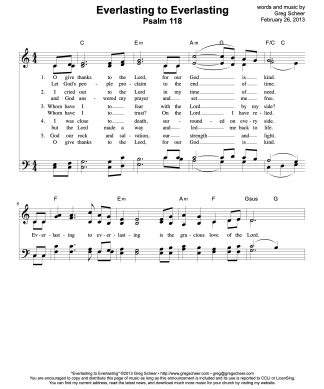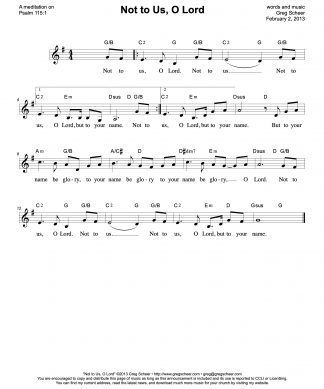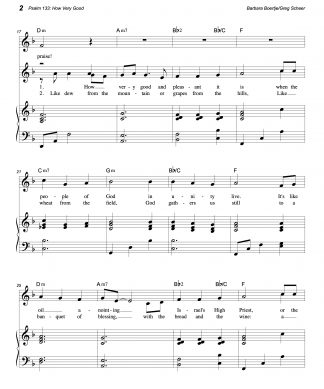
SYNOPSIS: Greg talks about considerations for Lent, including an introduction to the church year, Psalms and songs, and the 10 Commandments.
EPISODE SECTIONS:
- 0:00 – Introduction to Lent
- 3:02 – Ash Wednesday and remembering mortality
- 7:49 – Psalm 51 and penitence
- 10:44 – 10 Commandments
RESOURCES MENTIONED IN THIS EPISODE:
- Hymns: Throughout These Lenten Days, Lord, Who Throughout These Forty Days, God, Be Merciful to Me
- Contemporary Songs: Jesus, Draw Me Ever Nearer, Create in Me a Clean Heart, Restore My Soul
- Song by Greg: From the Dust You Shall Raise Us Up
- Liturgical Resource: Ten Commandments responsive reading
TRANSCRIPT:
Hello friends. This is Greg Scheer for the Greg Scheer Music Podcast. This episode we’re going to begin a multi-episode series on Lent. I’m going to give you some resources that are going to get you up to speed on Lent.
Read More. . .But of course, first, we have to discuss what Lent is. So for those of you who are not familiar with the church year, the church year is our basic cycles. You know, of course, Christmas and Easter, but the liturgical year, or the church year as it’s called, is a little bit more involved series of days. So generally speaking Easter and Christmas are the, kind of, pivotal moments, but if you follow the liturgical calendar then you would back up before Christmas with Advent, the preparation for Christ’s coming, and then before Easter with Lent, which is a season of preparation for Christ’s resurrection.
So Lent is a time that it tends to be. . . well, it has a number of themes that go along with it. So Lent is the 40 days before Easter minus Sundays. Now, 40 days minus Sundays. So there are some churches that do what’s called “hiding the alleluia,” and they don’t say “alleluia” for the whole of Lent. But actually, if you’re going to get really technical on this, then every Sunday in Lent is what’s called a “little Easter.” Every Sunday is a celebration, a little celebration of the resurrection. So, you know, officially speaking you can say “alleluia” all you want to during Lent, and we don’t have to get too law-driven about the whole thing.
But it’s 40 days of penitence and those type of things. This mirrors many of the 40s of the Bible. So think about Israel— 40 years in the wilderness, Noah— 40 days and nights on the ark, 40 days of Jesus’ temptation in the desert. So all those kinds of 40s. And there are indeed some songs that focus on this 40. I’m thinking, for example, there’s a song by James Gertmenian called “Throughout These Lenten Days,” and it’s one of these songs that talks about Lent. There’s another one called “Throughout These 40 Days and Nights,” [edit: Greg meant “Lord, Who Throughout These Forty Days”] and it’s basically a call to observe Lent. Now, those, they can be useful in certain situations, but I don’t get a lot of mileage out of those. They’re kind of one-trick ponies in a lot of ways. But I can lead you to some other resources that I think are really quite useful.
So, for example, Lent begins with Ash Wednesday. It’s the, Ash Wednesday is the first day of Lent. It marks off the season, and you’ll remember that in that service, you get the sign of ashes on your forehead. Usually what happens is they put the sign of ashes in the form of a cross on your forehead. And, it’s really quite a powerful service. It’s remembering that you are dust. It’s a service of mortality, and it remembers that you are completely reliant on God for life and breath.
So it’s a good way to go into this time of kind of extraordinary discipline, is to remember your own mortality. It’s also, I think, pretty important for us as Christians to always have an eye on the end game. So if we only talk about resurrection and joy and those kinds of things and never talk about death and the inevitability of our own departure from this world and into Christ’s presence, I think that we are underprepared for that.
So what I do with a congregation is I try to make sure that I have some songs that serve as bridges between the liturgical year and funerals. So, and I know this sounds very, very morbid, and I’m sorry. But one of the songs that I use a lot is one that I wrote called “From the Dust.” It’s actually a setting of Psalm 103, and it goes like this:
From the dust you shall raise us up.
From the dust of death, you shall raise us up.
From the dust, you shall raise us up.
From the dust of death, you shall raise us up.
So on the one hand it’s quite somber, but I think that one of the things that this serves is, from Psalm 103, where it says that God remembers that we are frail humans and that we come from dust and will return to dust. So it’s playing on that image. And it’s a really good one to sing on Ash Wednesday because we’re getting the sign of ashes, but it’s also one that I’ve used in funerals many times, and it’s a really good way to make a connection between what we do on Sundays, or on Wednesday in this case, and what we do in these kind of extraordinary circumstances like a funeral. And I think that we need to build in the hope of resurrection into the songs that we. . . Well, I should say it this way: We want to build in the inevitability of death and the hope of resurrection into all that we do on a week-to-week basis, so that it’s baked into our faith and that we’re ready to act on it when someone dies in our congregation.
So, Ash Wednesday. And then once we get beyond Ash Wednesday then we get into the Sundays of Lent. And I remember, it tends to be that Lent is quite, not morose, but it’s a little bit down, right? It’s not the happiest season; in fact it’s probably the lowest season in the church year. As I said, some people will not even sing “alleluia” during this whole time. And we tend to focus on issues of confession and contrition, those kinds of things. And I remember one time, I was in the middle of Lent, and someone comes up to me and says, “The music has all been so down lately.” And I said, “It’s Lent— you’re not supposed to be happy!” And I don’t know if that’s true, actually, if discipline and happiness don’t go together. But certainly there is that side of Lent, so penitence, discipline, confession, spiritual journey, all of those kinds of things are part of it, and I think are really good things to bring out. So, thinking spiritual journey, a really good one, and this is one that is not totally morose. It’s more just looking at the journey and thinking about following Christ wherever Christ will go, including to the cross.
Jesus, draw me ever nearer. . .
You know this one. So it’s the song by Margaret Becker and Keith Getty. That’s a really great one to highlight the devotional and the spiritual journey aspect of Lent.
Another place we’re probably gonna land a lot during Lent is Psalm 51. This is like the, they’re plenty of penitential Psalms, but this is the most famous one. This is the one that David wrote, sang, in response to Nathan’s prophecy saying that God saw his sin. And, so, a lot of times, you’ll read Psalm 51 in church during Lent, maybe you’ll have confessions based on it, those kinds of things. There are lots and lots of great songs based on Psalm 51. I’ll just give you a couple ideas. . . . We’ll see if I can do all these by memory! One is “God, Be Merciful,” and it’s to the tune REDHEAD. Love that.
God, be merciful to me. . .
You know that one, right? So that’s, it’s a hymn called “God, Be Merciful to Me.” That’s a great one. Then there’s the one from the 70s, I think.
Create in me a clean heart, O God,
and renew a right spirit in me.
So that’s a classic one, and it goes along with Psalm 51. If you get creative you often can add a reading of Psalm 51 together with the singing of that. That’s a great way to do that. There’s another one that I really like. There’s a song called “Restore My Soul” by Andi Rozier. He’s from the Harvest, one of the Harvest churches, and it’s just a really wonderful setting. It takes the tune O WALY WALY, which is, the folk tune would be “The Water Is Wide,” and it’s been used as a hymn a number of times.
Restore my soul, O Lord my God. . .
I can’t remember the words. And then it says, “At the cross, I find a way. . .” It adds a chorus to O WALY WALY. That’s a great one. I use that lots and lots. I’m kind of thinking out loud here about the kinds of songs. . . When I go into a season, I often will just create a, kind of a big pile of songs, and some of these are songs that I know that I definitely want to do by the end of the season. You know, it won’t be Christmas until I sing this song, or it won’t be Lent until I sing that song. And, so, you know, you’ll have your bag of tricks and you come back to those. And sometimes what I’ll do is I’ll create a document on my computer that is just, you know, “Lent Songs,” or “Palm Sunday Songs,” something like that, so I can kind of remember over the years what I’ve done.
Another thing, kind of a go-to resource during Lent, is the 10 Commandments. Now, Psalm 51 is a little bit lower-hanging fruit because we can sing it. The 10 Commandments, there are a couple 10 Commandments songs but no one wants to sing a 10 Commandments song. Sorry, to all the people that wrote 10 Commandments songs. But, the 10 Commandments, even though we talk about, kind of, hooking our morality, our faith’s morality on the 10 Commandments, we very rarely use them in worship. And most of us, I read a statistic one time, that most Americans and even Christians can’t name even, like, three of the Commandments. And, I think that’s a shame. I think that we need to use that more often.
Now, in my tradition, which is Christian Reformed tradition, there are many churches that, every week, will follow the confession and assurance with a reading of the 10 Commandments. It’s kind of an interesting thing. So, first of all, that’s one of the distinctives of the Reformed faith, is a very prominent confession and assurance every week in the service. Now, you might not be of that persuasion, and that might seem like too much. I totally get that. I do think that you should be confessing sometimes, in your church, that this is not something only that you do privately, but that one of the things we do in worship is do as a group the kinds of things that we want to encourage in people’s private faith. So if we never read the 10 Commandments, if we never meditate on those, if we never confess in church, then why would we expect that our people will go home and will have any kind of spiritual discipline of confession?
So, now I’m preachin’! So, we were at confession and many Christian Reformed churches will end the confession with the 10 Commandments. And the interesting theological idea here, is that rather than the 10 Commandments being this kind of, truancy officer that comes in and beats you and tells you what you did wrong, that instead in this tradition, you confess and you hear the assurance that God still loves you and forgives your sins, and then you are called to renewed life, and that’s when you read the 10 Commandments. So basically, these are laws of life rather than laws of death. And it says, “God has given you grace, so now let’s live into that grace. And here are 10 things that you should keep in mind as you live joyfully and as well as you can before God’s face.” And that’s the 10 Commandments.
So, and I understand that the 10 Commandments is a really hard sell in a church service. They can feel very, very dry. So one of the things that I’ve done is I recently wrote a responsive reading of the 10 Commandments. So the leader will say each of the 10 Commandments, and after it the congregation will say, let’s see, in the first part it will say, “Let us love our God with our spirit, soul, strength,” something to that effect. And then in the second part, where it’s dealing with laws about how we relate to humans, it says, “Let us love our neighbors as ourselves.”
And so then the people are just, first of all, kind of baked into that reading is the fact that there are two, what they call the two tables of the law. The first is how you should relate to God. The second is, I think the second six Commandments, are how you should relate to people. And so, in the first part of it, it says the Shema, which is “Love the Lord your God with all your heart, soul, and strength.” That’s the response to how we relate to God. And then the people’s response in the last half of the law is what Jesus said when he had to summarize the law, which is “Love your God with all your heart, soul, and strength,” and, “Let us love our neighbors as ourselves.” And so, so we get that, you know, kind of New Testament eyes as part of the 10 Commandments. And it’s a reading that, it flows pretty well, and you can find this at my website. I’m going to provide a link in the podcast episode so that you can click through to that and use it in your own services. I think it’s quite effective.
So that is an intro to Lent, and gets us started a little bit with thinking about this. I’m hoping that this will help you as you start to kind of wrap your head around what the next few months will be as you start to prepare for Lent. I hope that this will be helpful and give you a few resources that will lead you a little closer to planning your worship services well.
So, thanks. I, once again, am Greg Scheer. This is the Greg Scheer Music Podcast, and I look forward to chatting again.




